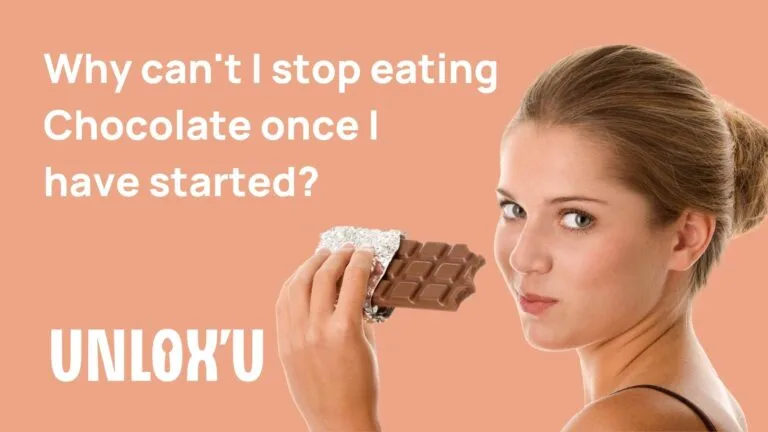
Can’t stop eating chocolate once you start?
Ever wondered why you can’t stop eating chocolate after one piece?
You are not alone!
I bet you have had thoughts before that you are either crazy and addicted to chocolate or that there is something special about chocolate.
Well, let’s explore and find the answers.
Addiction to chocolate or sugar
Is addiction to sugar real?
Think about it.
Do you ever sit down and eat sugar with a spoon?
I assume you don’t.
That means that we are not really addicted to sugar.
The research argues whether food is addictive or if it’s a coping mechanism for the brain when we soothe and comfort ourselves with food. However, what we do know is that food stimulates the body’s rewards system and we can see that people love the way food makes them feel. Some develop a habit of using food to change how they feel regularly (I talk more about it below). We also know that food changes our gut flora and what we crave. When we lack a good balance of healthy gut bacteria, we also might find ourselves wanting more sweet food.
If you would like to learn more specifically about sugar cravings, check out my Solve The Overeating Puzzle Podcast episodes:
How to stop sugar cravings
Sugar cravings – Why we crave sugar and what to do
Summary: Maybe our cravings for chocolate and sweet food are not black and white and need some more explanation.
In this post, I look into some
- Psychological
- Brain
- Biological aspects
of why we can’t stop eating chocolate once we start and how to be able to have only one piece of chocolate and leave the rest.
Do you prefer listening to a podcast?
This blogpost and many more other topics are also available as a podcast.
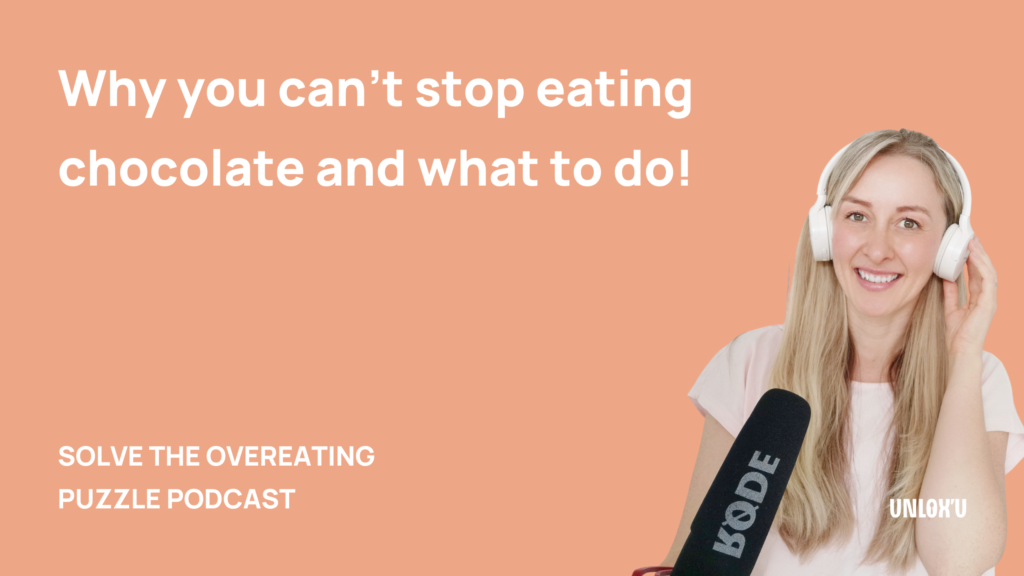
Reasons you can’t stop eating chocolate or chips
1. CHOCOLATE IS A VERY SPECIAL FOOD
Did you know that chocolate comes with a 2:1 ratio of fat to carbohydrates? What is it about this ratio? Well, breast milk has an identical ratio. Breast milk is what we likely drank when our mum soothed and comforted us. Therefore, at an unconscious level, this ratio of fat to carbohydrates feels like love, connection, and soothing. We associate chocolate with love and comfort. No wonder, this is what we crave when we don’t feel good.
2. HIGH PALATABLE FOODS
Chocolate, chips, pizza, basically all your favourite foods are high palatable foods. They often have the “perfect” combination of sugar/fat/salt that makes it extra yummy. This combination sparks the reward system in the brain which gives a sense of euphoria.
No wonder we want more of it, even when we already feel good. There is always this want to feel even better than we are already feeling.
Companies know this and they maximize this knowledge. They have specialists, psychologists and marketing experts who create the “perfect” combination to make you come back and buy more.
It’s these foods that can make us feel less in control and lead to overeating or compulsive eating. We don’t experience an addictive behavioural response to naturally occurring foods like strawberries or grapes.
Next time you feel out of control with some of these foods, remember that it’s probably not you, but rather the way this food is made.

3. PSYCHOLOGICAL ASPECT YOU CAN’T STOP EATING CHOCOLATE
Chocolate is also often seen as “bad” or “unhealthy” food. Indulging into this food often comes with feelings of guilt. This brings discomfort. We are naturally wired to avoid pain and seek pleasure. When we feel guilty, and have developed a habit of eating sweet food or chocolate to create comfort or pleasure, guess, what happens? Ta da! Chocolate!
By not allowing ourselves to enjoy chocolate or any other food you actually love, you create mental food rules. Food rules create psychological and perceived restrictions which make “forbidden” food more appealing. The more we avoid eating food we actually enjoy, the more this food will control us. By integrating this food regularly into our diet, it loses its grip on us.
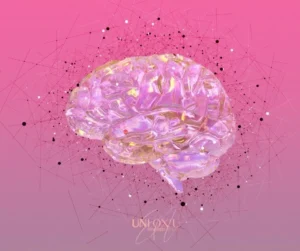
4. DOPAMINE IS RESPONSIBLE FOR CHOCOLATE ADDICTION SYMPTOMS
We are wired to seek pleasure and avoid pain.
Activities that create pleasure will be great motivators while activities that create discomfort will be often avoided.
This is a solution to ensure we do behaviours that are indispensable for the survival of the human species. These two behaviours are sex and food. If we didn’t like intimacy and sex, we would stop reproducing. If we stopped eating and didn’t receive pleasure from food, we would also die.
Next time you think loving food is a problem, remember that it’s actually just nature’s solution to keep us all alive.
Food stimulates the reward system in the brain which releases the feel-good hormone dopamine. This is how we start feeling “addicted” to the way food makes us feel. Even just looking or thinking about food releases dopamine and drives our motivation to eat until this need is satisfied. This is why we can’t stop thinking about chocolate until it’s gone. Or can’t stop eating after a bite of cake or a piece of chocolate. The surge of dopamine makes us want to continue to get more pleasure.
Even the thought of chocolate in the house releases dopamine which makes you want to consume it to get that satisfaction/reward.
The problem with this hormone is that it’s not even responsible for making us ever feel satisfied. It’s a hormone to make us want more. It’s basically a survival instinct to continue hunting and gathering and reproducing.
Being aware of how we respond to food and what drives our decisions, we can take the power back and regain control again.
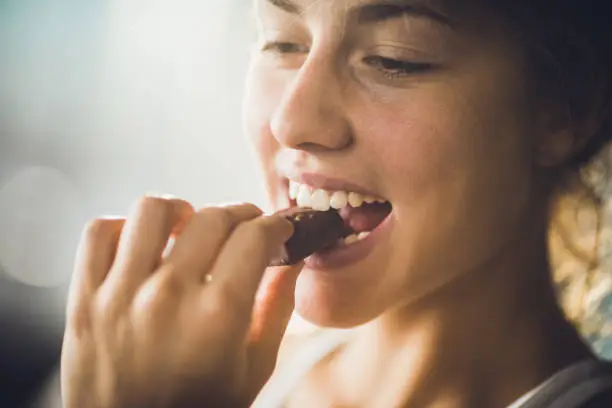
5. IMBALANCE IN GUT BACTERIA CAN CAUSE SUGAR AND CHOCOLATE CRAVINGS
We strongly want to believe we have control over our food preferences. Researchers are now arguing that maybe we have less control over what we crave and desire after all.
Different bacteria in our gut crave different things: yeast craves sugar, bacteroidetes enjoy fat, prevotella love carbs and bifidobacteria are fibre fiends. They each have their own way of signalling their favourite food by influencing our food choice and asking for their favourite meal. Microbes really know how to change our cravings and unfortunately, they are not always in our favour. Refined modern foods pose a problem for the gut, as they tend to shift bacterial growth in unfavourable ways.
One particular study even found that people who were overweight had a lower presence of a gut bacteria species called Bacteroidetes, whereas those who were leaner had higher numbers of the species.
When our microbe is healthy, people naturally choose food that is difficult to overconsume due to the satiating quality of these foods. Altering your gut bacteria profile can improve your energy, appetite, mood and how your clothes fit. With a few small changes, it is possible to “reset” your gut bacteria so they are far more supportive of your health.
6. OTHER FOOD AND CHOCOLATE OVEREATING TRIGGERS
In my work, I have discovered 13 underlying and often hidden reasons for sugar and food cravings, chocolate cravings, overeating and binge eating. We have covered some of them in this article.
In addition, there are also sensory triggers that create binge eating urges.
The 4 sensory triggers to overeating on chocolate – activated by the senses
- We see food and are hungry for it (For example, seeing the delectable chocolate cake in a cafe cabinet)
- We hear someone talking about food (An advertisement for pizza and we think, yes we would like to eat it).
- Smelling food (Walking past a bakery and suddenly craving bread)
- Taste. You have a little bit and want more. Many people say ‘Once I start eating chocolate, I can’t stop’

Don’t know why you can’t stop eating?
Download the FREE guide to find out which of the 13 underlying triggers lead you to crave food, overeat or binge eat.
Strategies for mindful eating when confronted with Chocolate Cravings
1. CREATE AWARENESS AROUND THE CRAVING
When we are confronted with cravings, we need to STOP and PAUSE. This gives us an opportunity to ask ourselves, ‘Why are we now suddenly thinking about food?’. Essentially, this creates awareness around this sensation of craving. And, if you were not thinking about food prior, you are probably not hungry and your body does not require it. In THIS video I am talking where to start when addressing Overeating Triggers.
This is not about restriction
Now, the restriction mentality is certainly not what I am advocating, as this causes deprivation (and more binging). So, you can still decide to consciously eat the food. But, we want to eat mindfully and not on autopilot. So, pause and ask yourself the following;
- ‘Am I hungry for this right now?’ (if you are, eat it!)
- ‘Do I want it later?’
- ‘Does this particular food align with my health goals?’
Ultimately, after acknowledging the trigger and asking these critical questions, you can decide to eat the food or not. Or, you might make a different more aligned food choice. Remember, what you choose to eat needs to be delicious and satisfying. This is critical as there is no point in eating food we do not enjoy!
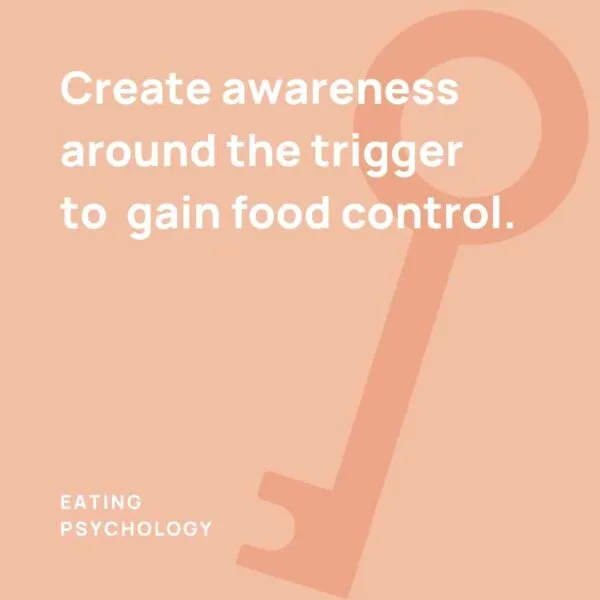
2. IMAGINE AND TAP INTO THE SENSATION
After you identify and create awareness around the craving, imagine having the flavour of the food in your mouth. For example, imagine biting into the chocolate cake and chewing it. Then, imagine it in your stomach and the feeling of eating it all. Then ask, do you want this right now? Do you want this sensation? Interestingly, sometimes your decision to eat it changes.
This is not a guilt-trip
To be clear, this process is not to make you feel guilty or bad. It’s about acknowledging the sensation and tapping into mindful eating practices. Some days you will eat it, and others you will not. So, these steps are very powerful to cultivate conscious eating decisions around our food choices.
What are you really craving?
Finally, these strategies might shine a light on another need you might be craving at a deeper level (such as an emotional need) Perhaps not, maybe you just want to eat it. And this is great too!
Do you want more support to be in control of chocolate, sugar or other food cravings? We are here to help. Book your FREE discovery call today to discuss how we can support you to create an easy relationship with food and achieve your health, weight and dietary goals.

Schedule your FREE Discovery Call
On this 60-75 minutes call, we will:
Identify your challenges, your history and your goals.
Assess the best approach to stop overeating, food cravings, binge eating and emotional eating.
Create a plan to achieve your food and body goals in an effective and sustainable way.
At the end, we will decide whether we are a good fit to work together to get you from where you are right now to where you want to be.



